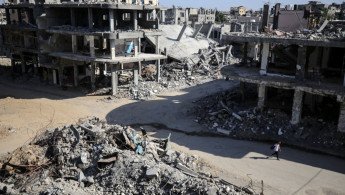Israeli strikes on Gaza generate more carbon emissions than annual output of 26 countries
Israeli strikes on Gaza in the first 120 days since the war on the enclave started, have generated more carbon emissions than the annual output of 26 countries combined, a new study by Queen Mary University in London has found.
The study raises concern over the significant carbon emissions and impact on the environment as a result of Israel’s ongoing war on the strip.
The findings state that between October and February, Israeli attacks on Gaza produced emissions ranging from 420,265 to 652,552 tonnes of CO2 equivalent.
The study makes an urgent plea for the mitigation of the impact of the war and other such crises on climate change and the environment.
The biggest causes behind the carbon emissions are emissions from flights, carbon footprint from munitions and the energy requirements for reconstruction, the report states.
According to the report, Israeli fighter jets and surveillance aircrafts accumulated between 57.8 and 85.9 million litres of fuel, causing a minimum of 261,800 tonnes and a maximum of 372,480 tonnes of CO2 emissions.
It also states over 100,000 artillery shells discharged by the Israeli military have caused around 12,000 tonnes of CO2 equivalent emissions.
Israel’s bombardment has also caused additional emissions of 58,165 to 72,706 tonnes of CO2 equivalent.
The study also assessed the emissions linked to energy production in Gaza.
Before the start of the war, Gaza was receiving half of its electricity from Israel, with the rest coming from local solar and energy plants.
However, Israel’s decimation of the enclave’s infrastructure, including power plants, has made Gaza dependent on diesel generators.
Using diesel generators has created an estimated 19,440 to 58,320 tonnes of CO2 equivalent emissions.
The heavy reconstruction needed to re-build Gaza after the war comes to an end will also create long term emissions, the study found.
This is expected to be around 46.8 tot 60 million tonnes of CO2 equivalent emissions, which is comparable to the annual emissions of over 135 countries.
In January, analysis showed that 50 to 61 percent of buildings in Gaza have been destroyed, equating to around 156,000 to 200,000 buildings damaged or destroyed.





 Follow the Middle East's top stories in English at The New Arab on Google News
Follow the Middle East's top stories in English at The New Arab on Google News


